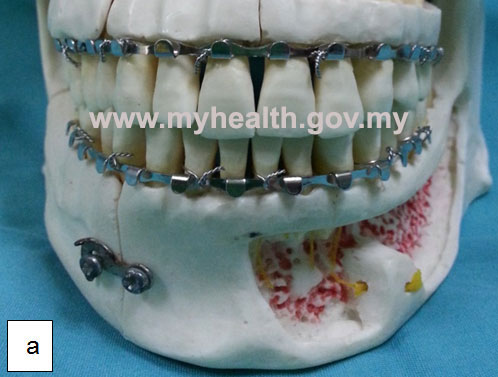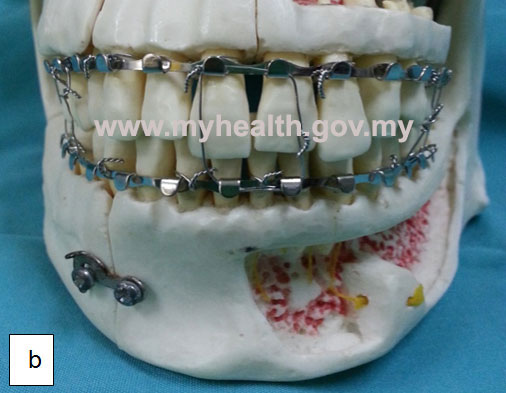Introduction
Fractured jaws can be due to road traffic accident, interpersonal assault, falls, industrial accident or sport injury. Patients usually presented with pain and swelling on the jaw, mobile jaw and derangement in the bite.
Treatment of fractured jaws
Open reduction
The treatment for fractured jaws includes open reduction and close reduction of fracture. Open reduction involves surgery under general aneasthesia. During the surgery, the fracture site is exposed, the fracture segments are approximated and the bite is checked prior to stabilization with titanium plate and screws.
Close reduction
Close reduction is a treatment without surgery where stainless steel wires are inserted in between the teeth to hold the archbars in place under local aneasthesia. Wire or elastic will be used to pull the upper and lower archbars together to restore the deranged bite into the normal bite. Patient who is treated with close reduction will have his or her teeth tie up for about 4-6 weeks. During the treatment patient can take blended diet via the straw.
- Wires are inserted in between the teeth to hold the archbars onto the teeth
- Wires are used to pull the upper teeth and lower teeth together to restore the correct bite
Oral care after treatment
- Oral wound careDo not disturb or probe on the sutured oral wound with any objects. The suture used in the oral wound usually is resorbable type. However, the sutures usually are removed one week after operation when the wound is healed. This is to prevent entrapment of food debris on the sutures. Patient who smokes needs to stop smoking because it will delay the healing of the wound and increase the risk of wound infection.
- BrushingThe archbars and wires usually are kept inside the mouth for 4-6 weeks for both open or close reduction. They tend to accumulate food debris, therefore patient must put more effort in brushing. The swelling and pain after surgery may not permit vigorous brushing, but patients can use soft toothbrush or child size toothbrush to brush the teeth.
- Antiseptic mouthwash.Patient usually is advised to use antiseptic mouthwash prescribed by the doctor 2 or 3 times a day to prevent wound infection. Besides that, patient is advised to rinse with water every after meal to keep the mouth clean. The antiseptic mouthwash helps to reduce the bacteria in the oral cavity thus reduce the risk of wound infection and gum diseases.
| Last Reviewed | : | 8 July 2015 |
| Writer | : | Dr. Hoe Ai Sim |
| Accreditor | : | Dr. Mohammed Amin bin Mohammed Jelani |









